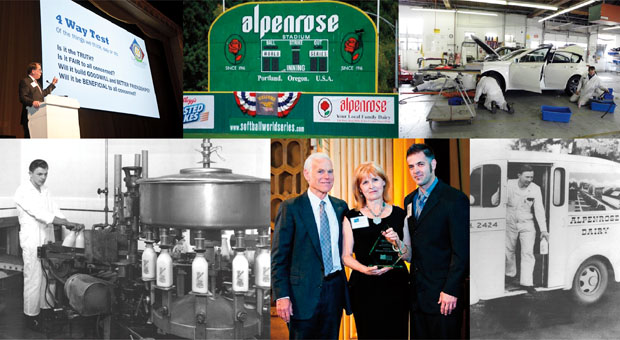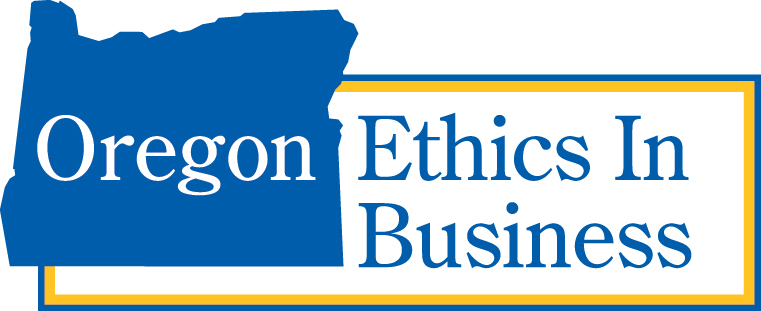BY JON SHADEL
Rotary’s Oregon Ethics in Business aims to raise consciousness about business ethics by honoring exceptional companies.
Rotary’s Oregon Ethics in Business aims to raise consciousness about business ethics by honoring exceptional companies.

BY JON SHADEL
“The collision-repair industry doesn’t have a stellar reputation for being ethical,” says Patricia McConnell, president and owner of Old Dominion Collision Repair in Eugene. “But after all these years, I simply cannot imagine running a business in a non-ethical manner.”
Old Dominion represents an Oregon business going beyond the expected by building endearing trust with customers, creating a healthy workplace where employees feel valued and regularly giving back to the community. For these ethical practices, McConnell’s company received the Oregon Ethics in Business Award in 2013, an initiative sponsored by the Rotary Club of Portland. By honoring companies like Old Dominion and Alpenrose Dairy, this Rotary program aims to raise consciousness about the importance of ethics in the state’s business community.
“This has been a platform since 2003 to promote ethics and exceptional business practices,” says Dick Clark, executive director of Providence St. Vincent Medical Foundation and current chair of the program’s steering committee. “We aim to showcase the best examples of high ethical standards in Oregon,” Clark says, likening the program’s goal to the Rotary Club’s Four-Way Test — an internationally accepted set of ethical standards Rotarians are encouraged to demonstrate in their daily lives and use as a guide to make ethically sound business decisions.
“The Four-Way Test encourages us to ask what is true, fair and beneficial to all concerned so we can build goodwill,” explains Clark. “The most important thing is that our business leaders trust each other. That’s really what Oregon Ethics in Business is about.”
McConnell’s story underscores her commitment to ethical business practices. She founded Old Dominion in 1973 with her husband and became the sole owner in 1988. Despite her limited experience in management and collision repair, she quickly earned a reputation for maintaining high standards of service while building trust in the community. Because of her integrity, she has appealed to customers who are often distrustful of the auto-repair industry.
Her voice cracks with sincerity as she recounts the many ethical questions she’s faced. “I’ve been challenged on a daily basis,” says McConnell, explaining how she could profit monetarily if her team chose to compromise the quality of service by using unreliable parts or taking shortcuts during repairs. But McConnell is committed to higher ethical standards. “We’re a spokesperson for the consumer and their vehicle,” she says. “For us, it’s important that our customers know they can trust us to get their vehicle back on the road safely.”
For McConnell, having elevated standards benefits her bottom line by keeping customers coming back. But she also believes fostering trust in the business community makes the state a better place to live and work. “For Oregon, we need to demonstrate that we put an emphasis on high ethical standards,” she says. “Otherwise, I think we’ll bring in businesses with low wages and poor products. That’s not who we want to be.”
Carl Cadonau Jr., co-president of Alpenrose Dairy, believes ethical business practices have kept the iconic Portland business alive during the last century. “I think our doors are still open because of how we do business,” he says. “We’re in a very competitive market. We’re a family-owned company competing against national businesses. And we’ve thrived because of how we treat our community.” It’s because of his company’s commitment to ethical values and community involvement that Alpenrose received the Oregon Ethics in Business Award in 2014.
Much has changed in the 98 years since Cadonau’s grandfather founded the company in 1916. Competitors have come and gone. The regulatory environment has evolved. And delivery methods have changed with technology. What hasn’t changed, Cadonau explains, is his company’s dedication to going beyond what is expected. “The key to success and longevity has always been doing right by your customers and employees.”
“Involvement in our community has always been a huge part of who we are,” he says, citing some of the ways Alpenrose gives back. Since 1956 Alpenrose Field has hosted baseball teams from around the world, including the girls’ Little League Softball World Series. The Alpenrose Velodrome, one of only 20 bicycle racing tracks in the United States, hosts national and international championships. Dairyville, a vintage replica of a Western frontier town, built near the company’s headquarters, is designed for families to enjoy quality time together. “This has never been a promotional thing,” he says. “It’s always been about our community.”
Cadonau, proud of the recognition Alpenrose has received, praises the work Rotary’s Oregon Ethics in Business does for the state’s business community. “They put eyes on the subject of business ethics,” he says. “They bring it to light, and that’s really important.”
The Rotary Club of Portland is working to further the dialogue around business ethics through new programs like awarding $10,000 in college scholarships to positively influence Oregon’s next generation of leaders. Additionally, proceeds from the awards ceremony support a weekend academy for local high school students to learn about business management and ethics.
“Oregon Ethics in Business is more than just a one-night awards event,” Clark concludes. “Our goal is for Oregon to have a sustainable and ethical business community, and that’s why we’re focusing the conversation on ethical standards.”

Nominate a Business
Click here to nominate a business or nonprofit by January 15 for the Oregon Ethics in Business Award.


